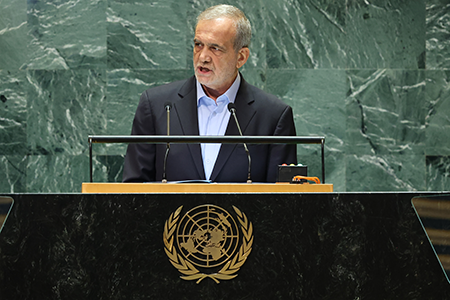“Right after I graduated, I interned with the Arms Control Association. It was terrific.”
Iranian President Opens Door to New Nuclear Talks
October 2024
By Kelsey Davenport
Iranian President Masoud Pezeshkian has offered to open new nuclear negotiations with the United States and its partners in return for lifting sanctions that are crippling his country’s economy.

In his first appearance at the UN General Assembly since being elected in July, Pezeshkian criticized U.S. President Donald Trump’s unilateral withdrawal from the 2015 nuclear agreement, known as the Joint Comprehensive Plan of Action (JCPOA), and “coercion-driven” sanctions strategy as “a threat-ridden approach.”
Arguing that “we have the opportunity… to enter a new era,” Pezeshkian said in his Sept. 24 speech that “[w]e are ready to engage with JCPOA participants” and “[i]f JCPOA commitments are implemented fully and in good faith, dialogue on other issues can follow.”
Pezeshkian’s focus on engagement with the United States and Europe marks a shift from his predecessor, Ebrahim Raisi, who derailed an opportunity to restore the JCPOA in 2022 and cast doubt on Iran’s commitment to nuclear negotiations. (See ACT, October 2022.)
But Iran’s recent decision to ship missiles to Russia and escalating tensions between Israel and Iranian-backed proxies in the region make it more challenging politically for the United States to accept Pezeshkian’s overture.
Meanwhile, Iranian Foreign Minister Abbas Araghchi has made clear that Iran will not wait until after the U.S. presidential election on Nov. 5 to negotiate over its nuclear program and believes that the 2015 nuclear deal could provide a basis for a future agreement.
In an interview with state-run IRIB News on Sept. 15, Araghchi said that it is not surprising that the United States does not want to negotiate before its presidential election but that Iran is prepared to move forward now and engage with other countries. He said previously that the JCPOA cannot be restored, but his latest comments suggested that the agreement still provides a suitable framework for future talks.
Araghchi’s comments came after Iran’s supreme leader, Ayatollah Ali Khamenei, said in an Aug. 27 speech that the United States cannot be trusted but that there is “no harm” in interacting in “certain situations.”
The Biden administration continues to suggest that it is waiting for Iran to take the first step back to negotiations. The U.S. State Department said in response to Khamenei’s comments that if Iran wants to “demonstrate seriousness or a new approach,” it should stop its nuclear escalations and “start meaningfully cooperating” with the International Atomic Energy Agency (IAEA).
IAEA Director-General Rafael Mariano Grossi told the agency’s Board of Governors on Sept. 9 that there has been “no progress in resolving the outstanding safeguards issues” with Iran.
The IAEA continues to seek answers from Iran about the presence of uranium detected at two locations that were never declared to the agency. (See ACT, July/August 2022.)
He said Iran’s assertions that “it has declared all nuclear material, activities, and locations” as required by its safeguards agreement is “inconsistent” with the agency’s findings. The IAEA must resolve these questions to provide assurance that Iran’s nuclear program is “exclusively peaceful,” Grossi said.
Grossi also told the board that Pezeshkian agreed to meet “at an appropriate juncture.” He encouraged Iran to facilitate the meeting so that Tehran and the agency can “establish a constructive dialogue that leads swiftly to real results.”
In a joint statement to the IAEA board on Sept. 13, France, Germany, the United Kingdom, and the United States reiterated that Iran’s “continued stonewalling runs contrary to its legal obligations” under its safeguards agreement. There is “reasonable doubt about the nature of Iran’s nuclear activities” as long as the IAEA’s concerns persist, the states said.
They added that “further action by the Board will be necessary” if Iran does not cooperate with the agency, including asking the IAEA to compile a comprehensive report on Iran’s nuclear program to inform a decision about what additional steps the board should take.
Although the states may push for a report, Grossi suggested it is not necessary. He said in the Sept. 9 press conference that the IAEA already has provided an assessment of what occurred at Iran’s undeclared locations and is focused on resolving the issues.
In a separate report on Aug. 29, the IAEA noted that Iran installed and began operating additional advanced centrifuges at its uranium-enrichment facilities over the past few months.
According to the report, Iran installed an additional 10 cascades of IR-2 centrifuges at the fuel enrichment plant at Natanz, bringing the total number of cascades to 31. Of the 31, 15 are now being used to enrich uranium, six more than the IAEA reported as operational in May.
The IAEA also reported that Iran installed an additional eight cascades of IR-6 centrifuges at the Fordow enrichment plant. Tehran announced the installation in June, but is not yet operating any of those machines. (See ACT, July/August 2024.) Enrichment at Fordow is more concerning from a proliferation perspective because the facility is buried deeply in the mountains, making it more difficult to target in a military operation.
Iran’s stockpile of highly enriched uranium (HEU) grew over the past quarter. The IAEA reported that Iran’s stockpile of uranium enriched to 60 percent uranium-235 was 165 kilograms as of Aug. 17, up nearly 29 kilograms from May, and its stockpile of uranium enriched to 20 percent U-235 grew from 751 kilograms to 814 kilograms.
Uranium enriched to 60 percent and 20 percent U-235 can be enriched more quickly to 90 percent U-235, which is considered weapons grade.
In a Sept. 10 statement to the IAEA board, U.S. Ambassador Laura Holgate said that if Iran is “interested in building confidence in the exclusively peaceful nature of its nuclear program, it should down-blend its 60 percent [U-235] stockpile and stop such production entirely.”
Iran’s HEU has “no credible civilian purpose,” Holgate said. She urged Iran to be fully transparent regarding its uranium- enrichment activities.
